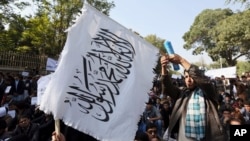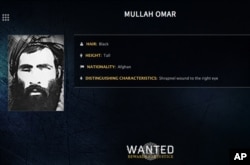As peace talks between the United States and Afghan Taliban enter a crucial stage, the Taliban leadership has announced a new chief negotiator, a man named Mullah Abdul Ghani Baradar.
According to a statement issued Thursday night by Taliban spokesman Zabiullah Mujahid, the action is intended to "strengthen and properly handle" the ongoing dialogue.
The change has signaled to many that the negotiations have progressed beyond any contact between the two sides in the past. Here is a look at why.
Who is Mullah Baradar?
Baradar, also known as Mullah Baradar Akhund, is one of the founding members of the Taliban movement. He was present in its first meeting headed by Taliban chief Mullah Omar in the autumn of 1994, in a village in Maiwand district of Kandahar province.
Known primarily as a military man and an astute commander, Baradar was sent to what was considered the most difficult places. As the Taliban solidified and expanded its hold on Afghanistan in the mid- to late 1990s, Baradar held many important posts in the government, fighting on various fronts. He became the governor of Herat at a time when fighting was fierce.
As a trusted companion of Mullah Omar, Baradar was third in line in the Taliban hierarchy. The second in line, Mullah Obaidullah Akhund, later died in a prison in Pakistan.
"He was always there. He was in every important meeting," said journalist Rahimullah Yousufzai, who has covered the region for decades.
When the Taliban government fell in 2001, Baradar was the deputy minister of defense. He was immediately listed as one of the top Taliban commanders on a U.N. Security Council sanctions list. Out of power and on the run, he continued to serve in important roles in the organization. After Obaidullah Akhund was taken into custody, Baradar took over as head of the Taliban Supreme Council, also known as Quetta Shura.
Mullah Akhtar Monsour, the man who became the head of the Taliban after Mullah Omar died, was previously a deputy to Baradar, according to the U.N. records.
"If he [Baradar] was not in custody, I think he would have been the leader after Mullah Omar died," Yousufzai said, adding that in many ways, he is considered as important as the current chief Mawlawi Hibatullah Akhundzada. Akhundzada has also appointed him his deputy for political affairs.
Baradar was taken into custody in 2010 from Karachi in a joint raid by Pakistani and American security operatives.
"At the time of his arrest, he was the effective No. 2 in the movement and the de facto operational chief of the insurgency," wrote Kate Klark in her piece for the Afghanistan Analysts Network, a Kabul-based research organization.
"His wife is Mullah Omar's sister. He controlled the money. He was launching some of the deadliest attacks against our security forces," an Afghan official who did not want to be named told the BBC at the time of Baradar's arrest.
According to United Nations Security Council documents, Baradar was born in 1968 in Yatimak village, Dehrawood district, Uruzgan province, Afghanistan. He was part of the Popalzai branch of the Durrani tribe, the same as former Afghan President Hamid Karzai.
What difference does he make?
The appointment of Baradar as the chief negotiator will likely bring additional credibility to the negotiation process and assuage any concerns of the Taliban cadre fighting on the ground, according to people who watch the region closely.
"Someone who is from Kandahar or southern Afghanistan usually gets importance among the Taliban. Secondly, they have more credibility. If you want to get the political process more acceptance among the cadre on the ground, it's helpful," said Tahir Khan, a journalist who has sources among the Taliban.
Baradar was released from a prison in Pakistan last October at the insistence of Zalmay Khalilzad, the special representative for Afghanistan reconciliation who is leading the negotiations from the American side.
"When they started talking to Taliban, the Taliban raised this issue whenever there was any contact with the Americans," Yousufzai said.
On one hand, the Americans wanted to facilitate the Taliban to move the process forward. On the other hand, they also wanted the Taliban's Qatar office to be empowered to make decisions. They wanted to "negotiate with the most important people among the Taliban," according to Yousufzai. Baradar's release fulfilled that dual purpose.






